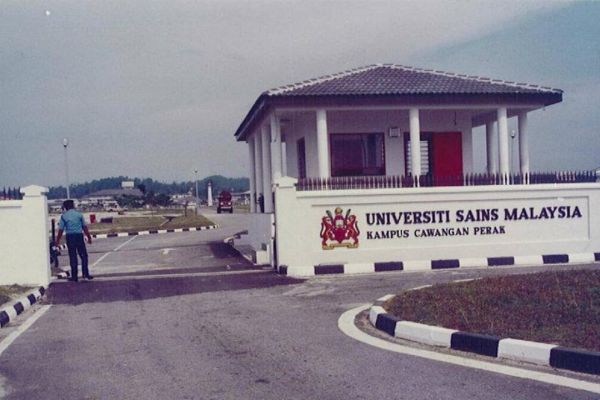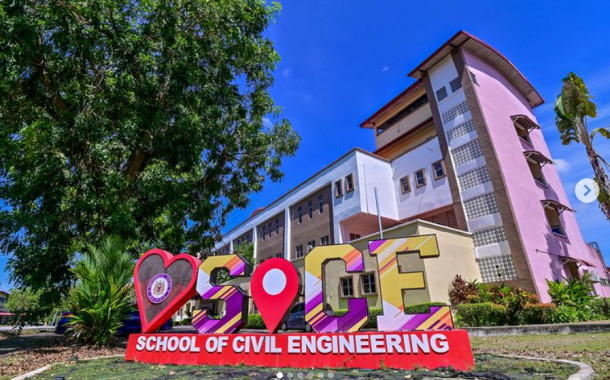
Research and APEX Status
Since the beginning of the century, the reputation of the school as a place of choice for postgraduate studies in all areas of civil engineering has increased. Basic and applied research studies carried out in the school have attracted students at both Master and Ph.D levels. Projects aimed at solving sustainability issues such as water supply, pollution, slope stability, drainage, mobility, and alternative pavement and construction materials have been actively pursued. Positioned as the only university in the country enjoying the prestigious APEX status, UniversitiSains Malaysia has received preferential funding, thus benefiting the school in terms of its capability to carry out research projects. The faculty members have also able to garner grants from central government agencies, international bodies, relevant ministries and industries.
Introduction
The School of Civil Engineering is located in Universiti Sains Malaysia’s Engineering Campus in NibongTebal which is located about 50 km from the main campus on the island of Pulau Pinang. Two thirds of its students population are undergraduates with the remaining being postgraduates pursuing Master and Ph.D degrees. The school is acknowledged for its active industrial and community engagements, and for its highly employable graduates. The school was founded in 1989 as one of the earliest engineering schools established in the northern region of Peninsular Malaysia. Classes began in July 1989 in the old Engineering Campus in Tronoh, Perak. From its humble beginnings with only 11 undergraduates for its inaugural intake. On the postgraduate front, the school is now hosting postgraduates from more than ten countries.

Our Mission
To nuture and sustain excellence in delivering comprehensive education, imparting knowledge, exploring frontiers of technology, and providing services to the industry and community, at the local and international levels, by applying the most advanced knowledge and leading expertise, creating innovative ventures, being truthful and upholding USM's motto, "we lead"
Philosophy and objectives
The School of Civil Engineering aims to be a leader at providing the highest quality of undergraduate education available in the country. The task is to provide all students with the opportunity for a broad-based educational experience and to enable students to address complex and comprehensive civil engineering problems. In addition, the school seeks to provide students with the necessary fundamentals for them to advance in the profession in response to the changing technology as well as societal needs and expectations. Last but not least, the school intends to offer the preparation and fostering of intellectual interest needed for graduate studies and research.
Consultancy and Community Projects

Reputation
With the current strength and reputation, the school has become a magnet of attraction for local and international students alike. Placement has been very competitive and based on merit. Undergraduate and postgraduate students comprise of local and internationals who are coming from many countries. The school offers MSc mixed-mode programs in Structural Engineering, Environmental Engineering and Fire Safety Engineering to provide opportunities for graduates and professionals to enhance their knowledge in these areas.

Talent and Governance
100% of the academic staffs of the School are Ph.D holders with professionals among them. The laboratories are well equipped with state-of-the-art apparatus and manned by well-qualified and highly skilled technical staff. Laboratories of the school are constantly consulted by the industry in the areas of structure and material testing, field and laboratory water quality monitoring, air and noise pollution measurement, environmental impact assessment, traffic planning, traffic impact assessment, and geotechnical evaluations. For more than 30 years since its establishment, the School of Civil Engineering has maintained its role as the trusted leader in tertiary education and home to students, researchers, lecturers, and engineers working together for the betterment of the society.
Recognition
The School of Civil Engineering has formally introduced the Outcome Based Education (OBE) process that is focussed at achieving certain specified outcomes in terms of individual student learning. The Educational structures and curriculum in the Bachelor of Engineering (Hons.) (Civil Engineering) programme USM are designed to achieve those capabilities or qualities highlighted earlier and they are regarded as means not ends. If the outcomes are not achieved they are rethought as to ensure there is a Continual Quality Improvement (CQI) within the education system. OBE is the essential requirement for Malaysia to become a full signatory member of a multinational agreement for the mutual recognition of engineering degrees, i.e. The Washington Accord (WA) in producing engineers ready for industry practice in the international scene.
Job Opportunities
Civil engineering graduates will have a diverse and challenging career. There is currently an abundance of employment opportunities for civil engineers in Malaysia and internationally. Civil engineers have a wide job prospect in both government agencies and private sectors as:
Consultants
Contractors
Developers
Entrepreneurs
Managers
Educators
Contact Us
Please feel free to explore our website to seek the information you need to make up your decision. Feel free to contact our Dean at "dean_civil@usm.my", if you need additional information.
School of Civil Engineering, Engineering Campus, Universiti Sains Malaysia, 14300 Nibong Tebal, Penang, Malaysia.
Or call us directly +6045996201